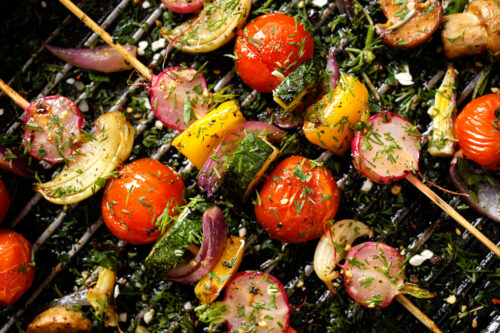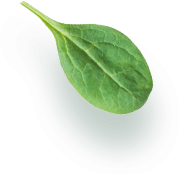Food
Grilled vegetables are a summer staple, incredibly versatile, healthy and delicious. They’re the perfect side dish for grilled meats and tofu, and leftovers are easily transformed into casseroles, wraps, bowls or snacks. Commonly grilled vegetables include bell pepper, zucchini, asparagus, and mushrooms, but why be common? Any vegetables can be grilled, so try out unique offerings like jicama, beets, carrots and cauliflower. Fruits (especially stone fruits) work well too.
What grillers should explore more of is the secret of vegetables. To discover the mystery, think onion. Bite into a raw one and yeow – a strong and piquant taste. But grill that onion or start to sauté and what happens? Water evaporates concentrating flavors, and carbohydrates inside cell walls start browning in a process known as caramelization, revealing a hidden sweetness. All vegetables have carbohydrates so all vegetables can caramelize, if they reach 330°F / 166°C. Sauteing, roasting, broiling and grilling deliver temperatures this high in the kitchen and grilling lends that additional smoky char people love; however, it does come with concerns. Cooking protein over an open flame can expose carcinogens like heterocyclic amines (HCAs). But since vegetables and fruits are mostly carbohydrate, you are free to grill, char and sweeten them up as much as you like.

Plant-Forward Grilling Tips
Preparation
Choose Fresh Vegetables and Fruits: Choose fresh, firm vegetables and fruits, and unexpected options such as tomatoes, romaine, figs or jicama. (Jicama tastes like French fries when grilled).
Cut Evenly: Cut vegetables into uniform sizes so they cook evenly. Slice no thicker than 1”, that way the inside will cook through without the outside burning.
Prep the Grill: Preheat the grill to medium or medium-high, clean the grates with a wire brush, then coat a paper towel with a high heat oil like avocado and brush the grates for added protection.
Marinating and Seasoning
Marinating vegetables not only adds flavor but also helps to tenderize, making them juicier and more enjoyable to eat. Simple marinades might include ingredients like vinegar or lemon juice, garlic, and fresh herbs. For those looking for a quick fix, olive oil and a sprinkle of flake salt can also work wonders. Marinate vegetables approximately 30 minutes; any longer and acids can break down vegetables and “cook” them. For fruit, melted butter is a lovely alternative to olive oil.
Try this Best Ever Marinade: Equal parts olive oil, balsamic vinegar, and soy sauce.
Grilling Techniques
Use Skewers or Baskets: For smaller vegetables or cut pieces, use skewers or a grill basket to prevent them from falling through the grates.
Direct and Indirect Heat: Use direct heat for vegetables that cook quickly (e.g., asparagus, bell peppers) and indirect heat for those that need more time (e.g., sweet potatoes, carrots).
Avoid Overcrowding: Give vegetables and fruits enough space on the grill to ensure they cook evenly and develop a nice char.
Turn Carefully: Use tongs, not forks, to turn items gently and avoid breakage. Flip once halfway through cooking.
Know Your Cook Times: Different vegetables have different grill times.
- Asparagus: 5-10 minutes
- Zucchini: 5-7 minutes
- Bell Pepper: 10-12 minutes
- Jicama: 10-12 minutes
- Carrot: (blanch first) 10-12 minutes
- Mushroom: 8-12 minutes
- Corn on the Cob: 5 – 15 minutes (varies with husk on or off)
Share, Like, Repeat
Categories

More from the Kitchen Talk
Let's Connect!
Share, Like, Repeat
Epicurean Group - 111 Main Street, Suite 3, Los Altos, CA 94022 - 415.895.2800
Corporate and Campus Restaurants | Fine Arts and Distinctive Community Dining | Exceptional Catering
